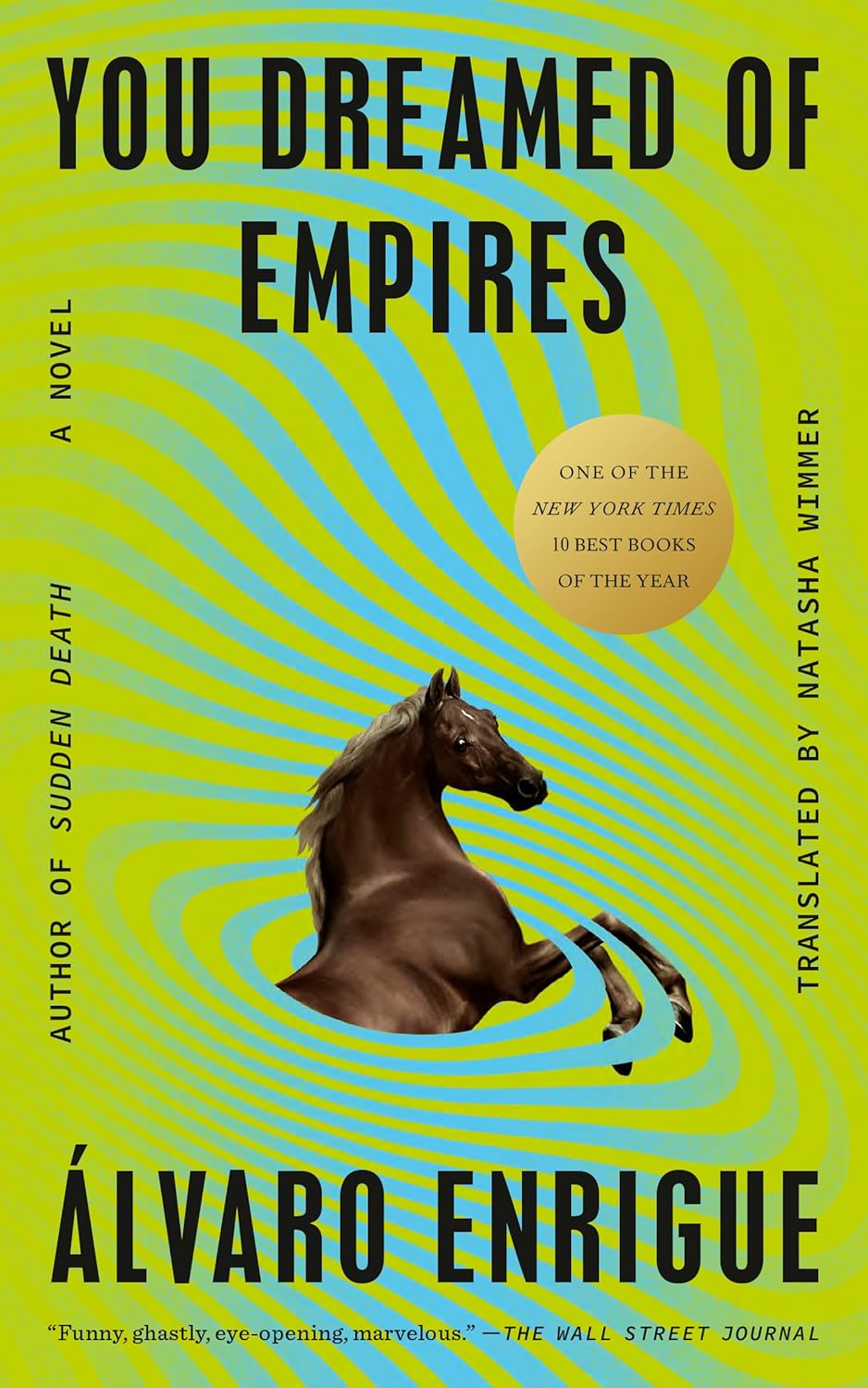
You Dreamed of Empires
II. Moctezuma’s Nap
by Álvaro EnrigueThe chapter opens with the ritual precision of Moctezuma’s afternoon nap—an act of imperial discipline that momentarily suspends the entire machinery of the Aztec empire. The silence demanded by his sleep is profound, yet its cessation, marked by the ringing of a silver bell, sends ripples through Tenochtitlan like a stone dropped in water. This carefully orchestrated pause becomes a metaphor for the fragile calm before historical upheaval, as the emperor’s rest coincides with the Spaniards’ uneasy acclimation to palace life. Aguilar, ever the observer, smokes his pipe while Caldera frets over clean clothes and cultural codes, their exchange laced with dark humor about impending sacrifice. The scene underscores the surreal tension of the moment: two civilizations hovering on the brink of collision, each misunderstanding the other’s rituals.
Within the palace’s labyrinthine corridors, the conquistadors grapple with their paradoxical status as both honored guests and potential captives. Caldera’s awkward attempt to don Aztec garments under Aguilar’s guidance—a comic yet poignant scene—reveals the Spaniards’ vulnerability beneath their bravado. The friar’s tattooed body and fluent cultural navigation contrast sharply with Caldera’s pale, horseman’s physique, highlighting the dissonance between European and Mesoamerican ideals of masculinity. Meanwhile, Cortés and Malinalli’s private exchange exposes her growing linguistic autonomy, a secret that threatens to upend the power dynamics of translation. When she reveals a priest’s ominous warning—“This wall has eyes”—the chapter crackles with paranoia, suggesting the palace itself is an active participant in the unfolding drama.
Moctezuma’s post-nap inertia mirrors the empire’s political stagnation. Resisting the demands of governance, he lingers in bed, delaying audiences and avoiding the regalia of power. His request for Atotoxtli—to be summoned only after her own smoke-induced calm—hints at the strained familial alliances underpinning the empire. The chapter’s quiet moments are its most revelatory: Aguilar’s wry observation that their reality would be dismissed as “chivalric romance bullshit” if ever recorded, or Caldera’s fleeting arousal at the thought of Tenochca warriors “dying to take a nibble of his leg.” These glimpses into the protagonists’ psyches lay bare the absurdity and terror of their predicament, where cultural fascination and mortal peril intertwine.
As the afternoon wanes, the Spaniards’ boisterous bathing in the palace pool becomes a metaphor for their entire enterprise—a disruptive splash in the still waters of an ancient civilization. Caldera, watching his comrades with detached unease, recognizes their ghostly transience: “a pack of ghosts” destined to either conquer or be consumed. The chapter closes with Moctezuma’s deliberate inaction, a sovereign’s hesitation that speaks volumes. His refusal to rise—to fully awaken—prefigures the empire’s fate, suspended between ritual and reality, between the old world and the new storm gathering at its gates. The nap ends, but the dream of empire lingers, heavy with portent.
FAQs
- Why does Moctezuma’s nap hold such symbolic weight?
- His nap is a ritual of imperial power—its enforced silence and subsequent disruption (via the bell) mirror the fragile order of the Aztec empire. The moment he wakes, the entire city stirs, foreshadowing how his choices (or inertia) will trigger upheaval.
- What does Aguilar’s comment about sacrifice reveal?
- When he tells Caldera, "You’ll go stark naked with nothing but a breechcloth," it underscores the Spaniards’ dual role: honored guests now, potential sacrifices later. The casual tone highlights how normalized violence is in this world.
- Why is Malinalli’s secret understanding of Castilian significant here?
- Her hidden fluency ("Pronto") threatens Cortés’s control. By withholding this from Aguilar, she becomes a wild card—both bridge and potential betrayer between cultures.
- How does the Spaniards’ bathing scene reflect their cultural intrusion?
- Their boisterous splashing ("a pack of ghosts") contrasts with Aztec restraint, symbolizing colonial disruption. Caldera’s unease (floating like a "ghost" himself) hints at their doomed ephemerality.
- What does Moctezuma’s reluctance to govern suggest?
- His refusal to hold court ("The throne room seemed far away and cold") mirrors the empire’s decay. Even his order to summon Atotoxtli only after her nap reveals a ruler avoiding confrontation.
Quotes
- On Imperial Ritual & Power:
- "The silence his nap demanded was imperial. Nothing moved in the palace between the moment he entered his room and the instant he opened his eyes."
- — Narrator (The nap as a metaphor for suspended history)
- On Cultural Misreading:
- "No wall has eyes."
- — Cortés (Dismissing the priest’s warning, highlighting Spanish blindness to Aztec spirituality)
- On Translation & Secrecy:
- "Don’t tell Aguilar you speak Castilian."
- — Cortés to Malinalli (Language as a weapon of control)
- On Colonial Brutality:
- "What they’d done to the islands could not be allowed to happen in the Anáhuac."
- — Caldera’s thought (A rare moment of Spanish self-awareness about their violence)
- On Gender & Power:
- "Make sure [Atotoxtli]’s had a smoke before she comes; I can’t stand her when she’s in a mood."
- — Moctezuma (Reducing his sister-wife’s fury to a temperament to be medicated)
- On Historical Irony:
- "When somebody puts what’s happening to us now in a book, they’ll think it’s more chivalric romance bullshit."
- — Aguilar (Mocking the absurdity of their own mythmaking)
- On the Conquistadors’ Fate:
- "A pack of ghosts."
- — Caldera (Seeing his comrades as already dead, their splashing a fleeting disturbance)
